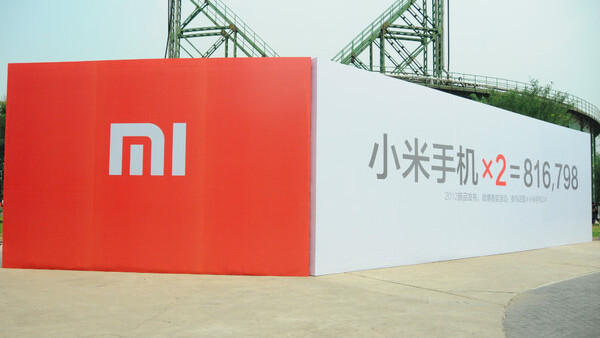
Apple and Samsung are household names all over the world for their smartphones, and it may be difficult to imagine that another smartphone firm — let alone a Chinese one — could possibly be muttered in the same breath. But have you heard of Xiaomi? Indeed, can you even pronounce its name properly (it’s Shiao-Me)?
If celebrities can cross the boundaries of countries easily to attract fans from all over the world, red-hot Chinese smartphone firm Xiaomi, which displayed its celebrity-like appeal yesterday at its launch event, will soon show that it can take its influence overseas. The only step left for it is to launch its products internationally.
Xiaomi commands loyalty from its fans
Xiaomi showed media from all over the world yesterday exactly how popular it is in the world’s largest smartphone market — its launch event for the Mi-3 Android phone and a 3D smart TV was overwhelmingly packed with people, so much so that the security guards had to come out in full force to prevent more people from heading into the conference hall.
Many of those who turned up yesterday were Xiaomi fans in their mid-20s, who (presumably) took the day off work or school to come and support the company.
Those who were locked out were obviously not happy. I even witnessed a scuffle when someone tried to break through the barrier to try to get in, and at least five security guards laid hands upon him to push him back. There was plenty of shouting, angry words and unhappiness in general. Even journalists did not have priority — many also got locked out of the event that they went down especially to cover.
Despite being invited, many journos & I got locked out of @XiaomiChina event for lack of space. Thx @SirSteven for picking up the slack.
— Paul Bischoff (@pabischoff) September 5, 2013
Crowd at #XiaomiChina shows company buzz. But need to learn crowd control, no media seats, Hugo Barra left briefly cause of media scrum.
— Paul Mozur (@paulmozur) September 5, 2013
Crowd control and event organizing skills: zero. Loyalty of fans: 100.
To inspire this massive amount of loyalty is something that many international tech companies would probably kill for. It seems like in general, only celebrities or cults have this power — and Xiaomi has now taken on a celebrity role in the Chinese tech sector, despite just being founded three years ago and releasing its first device as recently as 2011.
On its Facebook page, Xiaomi says it has over 3.5 million users and 2.7 million fans currently: amazing growth for such a young tech company. Its revenue for the first half of 2013 reached $2.15 billion after it sold 7.03 million devices — just shy of the 7.19 million units it sold during the whole of 2012.
Xiaomi was born to be global
The various reasons for Xiaomi’s success in China is likely something that can be replicated overseas. Xiaomi is a company that was born to be global from the start despite starting in China: it is made up of employees from various international tech companies — among them Microsoft and Google.
Its overseas ambitions have been cemented by recently nabbing Hugo Barra, previously Google VP for Android.
Barra took to the stage at Xiaomi’s event yesterday to say he has been following Xiaomi from the start and that the work the company has done with its highly-customizable Android-based MIUI firmware has been impressive:
I am incredibly proud of the amazing work you guys have done with MIUI. Xiaomi is a huge Android supporter and is a very important part of the Android ecosystem here in China. Now I believe the entire world is ready to learn from Xiaomi.
Lei says that Barra, who is moving to Beijing, can help Xiaomi make MIUI better and accelerate the company’s global ambitions.
Basically there are three things at play here for Xiaomi: low prices, high-end smartphones and user feedback (which in turn leads to flexibility). Applying Xiaomi’s various tactics overseas would definitely work well, especially in emerging economies — indeed it wouldn’t be too far-fetched to think of Xiaomi as Apple for less-developed countries.
Low prices, high-end smartphones
The obvious reason for Xiaomi’s appeal is that its smartphones pack a lot of punch for the price point that they sell at — simply because the company adopts a different model from traditional smartphone companies. Unlike Apple, for example, which makes money from margins on selling its phones, Xiaomi’s revenue stream comes from its software — the highly-customizable MIUI firmware that is based on Android.
Its third-generation smartphone launched yesterday, the Mi-3, has been touted as the fastest smartphone in the world.
The phone is powered by dual processors that are top-notch in the tech world now — there is a TD-SCDMA (China’s 3G service) version powered by a 1.8 GHz Nvidia Tegra 4 processor and another China Unicom/operator version running on different networks that is powered by Qualcomm Snapdragon 800.
Despite its slim frame, with its thickness coming in at only 8.1mm, the Mi-3 packs a 3050 mAh battery that should give it plenty of juice. Its camera feature is also pretty impressive, coming in at 13 megapixels with dual LED flash lights.
And how much does the Mi-3 cost? A mere CNY1,999 ($327). Comparatively, the Samsung Galaxy S4 is retailing for CNY5,199 ($850).
With yesterday’s event, Xiaomi also crossed over to the smart TV sector, launching an Android-powered 47-inch 3D smart TV coming in at only CNY2,999 ($490) that supports wireless streaming of TV shows and Android games.
User feedback is part of Xiaomi’s manufacturing process
However, there is one other very huge reason that Xiaomi has inspired so many fans that people don’t tend to zoom in on: the way it includes users in its whole ecosystem — from the software to the hardware. Basically, Xiaomi users all have a say in the final products that the company launches.
Compared with the closed ecosystems in use within many tech companies, Xiaomi’s open system has drawn a lot of users who have had enough of being unhappy with certain features in their smartphones but no power to be heard.
Overseas users would likely be attracted to Xiaomi’s system for the exact same reasons that Chinese users are enamored with.
Xiaomi’s commitment to its users can especially be seen in its MIUI software, which is now in Version 5, and which Barra praised. The Android customization software is highly flexible and incorporates user feedback to release weekly updates.
Hiring a man central to the Android ecosystem hints at Xiaomi’s ambition to grow its own Android customization software system into a global force — perhaps to even take on Android itself?
Tying up with social networking sites ups Xiaomi’s cool factor
With the low price points of Xiaomi products, people can afford to buy them off-contract and unsubsidized. This means that Xiaomi gets to sell its phones directly — via its own website and via social networking sites such as Sina Weibo and Tencent QQ. Tapping on the reach of these sites and aligning its image with them makes Xiaomi a hip, cool company that understands what the younger generation wants.
Speaking with a few local Chinese yesterday, someone pointed out to me that Xiaomi basically appeals to those who follow trends easily — the younger generation who also have less disposable income. Simply put: Xiaomi understands the power of influence. Just like a celebrity, Xiaomi knows how to make use of the power it has, and it is little wonder that the company has managed to climb so fast in such a short amount of time.
Xiaomi will soon hit the world
This is why the world should watch out for Xiaomi — this company understands what makes its customers tick and caters to its users at all points of the smartphone manufacturing process.
It probably means less control over its product — and some would say users don’t always know best — but it is interestingly a concept that smartphone companies haven’t really put into motion yet (despite all the vows about listening to customers and having customer service centers).
It also does not hurt that basically Xiaomi phones represent exceptional value for money. With the combination of these killer factors, it may not be long before Xiaomi hits the international world as a force to be reckoned with.
Headline image via Xiaomi
Get the TNW newsletter
Get the most important tech news in your inbox each week.









